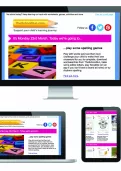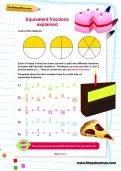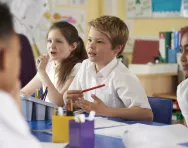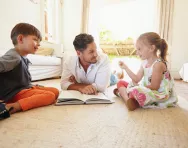TheSchoolRun.com closure date
As we informed you a few months ago, TheSchoolRun has had to make the difficult decision to close due to financial pressures and the company has now ceased trading. We had hoped to keep our content available through a partnership with another educational provider, but this provider has since withdrawn from the agreement.
As a result, we now have to permanently close TheSchoolRun.com. However, to give subscribers time to download any content they’d like to keep, we will keep the website open until 31st July 2025. After this date, the site will be taken down and there will be no further access to any resources. We strongly encourage you to download and save any resources you think you may want to use in the future.
In particular, we suggest downloading:
- Learning packs
- All the worksheets from the 11+ programme, if you are following this with your child
- Complete Learning Journey programmes (the packs below include all 40 worksheets for each programme)
You should already have received 16 primary school eBooks (worth £108.84) to download and keep. If you haven’t received these, please contact us at [email protected] before 31st July 2025, and we will send them to you.
We are very sorry that there is no way to continue offering access to resources and sincerely apologise for the inconvenience caused.
What is oracy?

We’re all keen for our children to build their literacy skills at school, and become confident readers and fluent writers. But developing a mastery of English isn’t just about reading and writing: it’s also about becoming a good speaker.
Oracy explained
Oracy is the ability to express yourself clearly and communicate with others effectively through spoken language.
‘It’s about having the vocabulary to say what you want to say, and the ability to structure your thoughts so that they make sense to others,’ explains Billie Dunne, senior programme manager at the National Literacy Trust.
A key part of oracy is for children to think carefully about the language they’re using, and tailor it to their subject, purpose and audience. For example, a Year 6 pupil should understand that they need to use simpler words and sentence structures when explaining the rules of a game to a Reception child than they would if they were with their peers.


Boost your child's maths & English skills!
- Follow a weekly programme
- Maths & English resources
- Keeps your child's learning on track
Oracy involves embracing different speaking skills, such as:
- Discussion: exchanging ideas with others
- Instruction: telling someone what to do, or explaining facts
- Dialogue: having a conversation with someone, listening and showing an interest in what they say
Oracy isn’t, however, just about being a good talker – or talking lots. It also includes listening to others, and responding appropriately.
Why oracy matters
So much in life depends on being a good communicator, so it’s vital that children learn the importance of oracy from a young age.
‘Good communication and language skills support children’s ability to learn, think about and understand the world, and interact with others,’ explains Billie.
Indeed, children who start school with limited communication skills are six times less likely than their peers to reach the expected standards in English at the end of Year 6.
Good oracy also leads to improved performance in other curriculum areas, including maths and science.
Developing early oracy skills isn’t just important for children’s education, though.
Children who communicate well are more likely to form good relationships with other children and adults, and may be less prone to behaviour sanctions as they can express their frustrations verbally rather than lashing out or losing their temper.
Focusing on oracy in primary schools has a big impact on children well into the future.
Children who are good communicators are less likely to have mental health problems as adults, possibly because they’re more able to express their feelings.
‘Good oracy skills also help them secure employment later in life, with over two thirds of employers rating literacy as one of their three most important considerations when recruiting school leavers,’ says Billie.
‘We believe that embedding oracy into the curriculum is key to improving children’s life chances.’
Oracy and speaking and listening skills in the National Curriculum
Oracy may not be officially assessed by SATs, but it’s an important part of the National Curriculum, and not just in English.
‘Spoken language is a requirement across the curriculum because it helps students to express and explore ideas before they commit them to paper, supporting the development of reading and writing,’ Billie explains.
‘More than this, talking through an idea, problem or finding enables pupils to share their thinking and learn from each other.’
The National Curriculum says that having ‘a strong command of the spoken and written word’ is one of its overarching aims. In particular, it says children should:
- Use discussion in order to learn;
- Be able to elaborate and explain their understanding and ideas;
- Be competent in the arts of speaking and listening, making formal presentations, demonstrating to others and participating in debate.
It sets specific speaking and listening objectives within the English programme of study for each year, and oracy is also developed through other curriculum areas, such as drama.
Oracy is measured through giving presentations, performing, and participating in class or small group discussions.
Oracy in the classroom
Oracy teaching in primary schools is both passive and active. Sometimes activities focus explicitly on developing spoken communication skills, and sometimes they’re a by-product of what children are learning and doing in other areas, such as science, RE and PSHE.
‘The teaching of oracy skills is inherently important, as they are the foundation of learning and set children up for success in education and beyond,’ says Billie.
Example activities that are used to develop oracy in primary schools include:
- Setting ground rules for speaking and listening in class, such as putting your hand up before speaking, waiting to be chosen, and not interrupting each other.
- Presentations on a specified subject, or a subject of their own choosing. These could be individual presentations or in pairs or small groups, in front of their class or the whole school in assembly. At the lower end of the school, this is often ‘show and tell,’ while older pupils might make a topic-based presentation.
- Discussions as a pair, small group or whole class, for example about religious beliefs, story plots, or predicting the outcomes of experiments.
- Hot seating: a drama technique where one child sits in the ‘hot seat,’ and the other children ask them questions to answer in character.
- Exploring a text through performance – not just re-enacting what actually happens in the book, but also acting out what characters might do or say in a particular situation.
- Giving oral book reviews to the rest of the class, and then taking questions.
- Structured debates, with one group of pupils for and another against a certain topic or question, such as, ‘Is it right to bully a bully?’
- Putting on class assemblies attended by the rest of the school and often parents.
- School council meetings, where council members collect questions and concerns from other pupils and present them to their fellow councillors and teachers.
- Group work, where communication and listening to each other are essential.
- Older children being play leaders for younger children at breaktimes, explaining the rules of a game and making sure everyone plays correctly and fairly.
- Circle time: a class discussion, often weekly, where everyone sits in a circle and talks over issues affecting the class, such as too much talking during lessons, or bad behaviour in the playground. This encourages oracy skills like expressing opinions, turn-taking and respecting others’ views.
7 ways to promote oracy at home
Try these techniques to help your child become a more confident communicator, in school and at home.
1. Read aloud to your child
‘Reading aloud to your child, well beyond the age they can read for themselves, combines the benefits of talking, listening and storytelling within one activity that helps children build their vocabulary, learn to express their thoughts, and understand the structure of language,’ says Billie.
2. Record a video diary
Many kids aspire to being vloggers or YouTube stars, so encourage them to start a video diary, either to chart their everyday life or to record special occasions like birthdays and holidays. For safety’s sake, keep these within the family rather than broadcasting them online.
3. Play word games
Games like 20 Questions, Guess Who? and I Spy are great for helping children use descriptive language and think critically about what they’re saying.
4. Talk about their day
Ask your child, ‘What did you do today?’ and they’ll often claim they can’t remember, so find different ways to talk about what they’ve been up to. Eating your evening meal as a family is a good way to encourage conversation, while older kids are often more chatty in the car, where they feel less like they’re being interrogated. You could also try our tips for asking the right questions to elicit information.
5. Phone a friend (or relative)
Persuade your child to take a break from text and WhatsApp and develop their speaking skills by making an actual phone call. ‘Encouraging them to speak to different family members on the phone or on a video call will build confidence,’ says Billie.
6. Go on a nature walk
This is a great pre-phonics activity for young children, who can be encouraged to listen carefully to the sounds they hear – from traffic to birdsong – and describe them. They can also describe the natural sights they see, such as trees, animals and birds and the sky.
7. Sign them up for a club
Joining extracurricular clubs is a good opportunity for your child to converse with different people outside the home or school environment. Many of them also involve taking instructions (such as being coached in sporting techniques or to complete science or art projects), and introduce them to different vocabulary relating to their new hobby.
The National Literacy Trust’s Words for Life programme has lots of great tips and activity ideas to encourage speaking, reading and writing skills in children from birth to 11 years.








